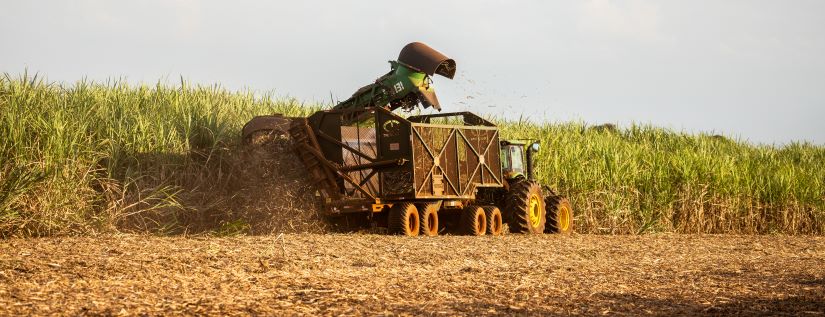São Paulo, Brazil, August 25th, 2021 — IFC, a member of the World Bank Group, is supporting a new project in Brazil to strengthen the diversification of the country’s energy matrix. The $70 million financing for Grupo Cocal will expand the company’s ethanol and biogas production and will contribute to the renewal of its sugarcane plantations, with agricultural and climate-smart techniques that will be conducted in real time and with excellent accuracy.
The financing package consists of $40 million from IFC’s own account and $30 million mobilized with two other financial institutions, Banco Itaú BBA and Rabobank. IFC’s loan will support Grupo Cocal’s investment program estimated at $92 million, which includes the construction of a biogas production unit in the municipality of Narandiba (Sao Paulo State), the renovation of 27 thousand hectares of sugar cane and the replacement of agricultural machinery and equipment. IFC’s resources will be used specifically in the construction of the biogas production plant and in agricultural practices that have vertical gains in production, qualitative gains in raw material, use of technology and precision agriculture.
“Cocal has focused on innovation and strengthened its ESG (Environmental, Social and Governance) practices. Thus, the investment in projects in the industrial and agricultural sectors represents an environmentally and socially viable solution, while generating versatile, clean, and competitive products for the region, boosting the local economy and regional development. It also allows Cocal to fit into the RenovaBio Program by promoting the use of biofuel and biofertilizers, offering an alternative outside the fossil-based production chain”, says Paulo Zanetti, Managing Director of the Cocal Group.
“This project is aligned with one of IFC’s pillars in Brazil, which is to make environmental and social sustainability a business driver for agribusiness. Increasing the share of sustainable biofuels and clean energy in the country’s energy matrix is strategic for Brazil to reach the goals established in the Paris Agreement,” says Carlos Leiria Pinto, IFC’s Country Manager in Brazil.
IFC’s investment will enable Cocal to produce biogas, biomethane, CO2 and electricity from vinasse and filter cake, noble industrial by-products from the sugarcane milling process, within the concept of circular economy. Initially, biogas will replace fossil fuels in the industries, and it will be distributed by Cocal’s own trucks. As of July 2022, the product will also be distributed to homes, businesses, industries, and vehicles in the region of Presidente Prudente, Narandiba and Pirapozinho (in the State of São Paulo), via a pipeline built in partnership with GasBrasiliano. In addition, biogas will be used to replace diesel in the company’s automotive fleet, contributing to the decarbonization process. Cocal is one of the first companies to adopt this technology to produce biogas from agro-industrial residues and the first to purify biogas into biomethane, a fuel equivalent and interchangeable to natural gas, according to the National Petroleum Agency (ANP, for its initials in Portuguese).
In the field of new technologies, Cocal is a pioneer in a planting technique developed in partnership with a recognized local university center, the Escola Superior de Agricultura Luiz de Queiroz – Esalq/USP. The technique conserves the soil while preventing erosion, increasing productivity potential, and allowing Cocal to produce more without land expansion.
This is IFC’s first financing for Cocal, and the institution is strengthening its presence in the sugar, ethanol, and renewable energy sector. The resources of this project are 100% focused on combating the effects of climate change.
Brazil is the seventh-largest emitter of greenhouse gases (GHG) in the world. In 2015, the country signed the Paris Climate Agreement with a commitment to reduce GHG emissions by 43% between 2005 and 2030. Brazil also committed to increase the share of sustainable biofuels in the Brazilian energy matrix to approximately 18% by 2030, expanding the consumption of biofuels and the supply of ethanol. An important step towards achieving this goal is to achieve 45% renewable energy in the energy matrix by 2030. IFC’s investment in Cocal assists a strong sugar and ethanol player in the production of sustainable biofuels, biogas, and biomass-based electricity through cogeneration from sugarcane bagasse.
About Grupo Cocal
Cocal is a Brazilian, family-owned producer of sugarcane, sugar, ethanol, electricity and started its activities in the biogas and CO2 market this year. Operating for more than four decades in the sugar-energy sector, its industrial plants are in the cities of Paraguaçu Paulista and Narandiba, in the State of São Paulo. The Group employs about 5,000 people. For more information, visit www.cocal.com.br.
About IFC
IFC—a member of the World Bank Group—is the largest global development institution focused on the private sector in emerging markets. We work in more than 100 countries, using our capital, expertise, and influence to create markets and opportunities in developing countries. In fiscal year 2020, we invested $22 billion in private companies and financial institutions in developing countries, leveraging the power of the private sector to end extreme poverty and boost shared prosperity. For more information, visit www.ifc.org.

